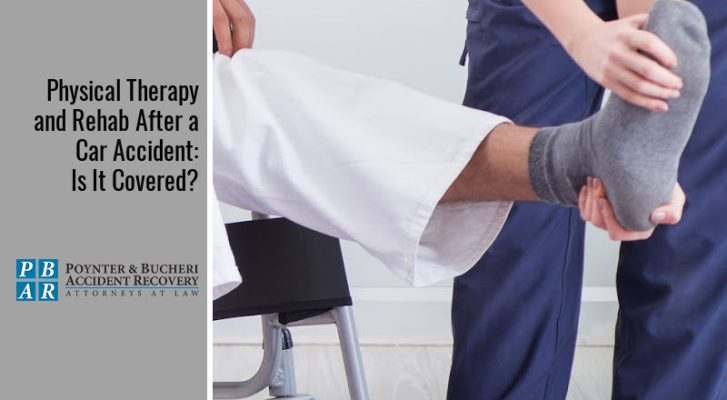
Physical Therapy and Rehab After a Car Accident: Is It Covered?

The simple answer to this question is yes – if someone’s negligence has caused your car accident injury, that person (or that person’s car insurance) is liable to compensate you for all of your damages. These can include:
- Ambulance and hospital bills
- Medication and prescription expenses
- Medical equipment (like walkers, wheelchairs, or crutches)
- Rehabilitation costs
- Physical therapy and rehabilitation
A personal injury claim includes all kinds of other damages, both economic (like lost wages) and noneconomic (like pain and suffering). In this article, we’ll focus on physical therapy and rehabilitation.
What is rehabilitation?
Rehabilitation can include anything that helps you to regain optimal physical functioning. This may include physical therapy, but also occupational or speech and language therapy.
What is physical therapy?
According to the APTA (American Physical Therapy Association), the job of a physical therapist is to “improve quality of life through prescribed exercise, hands-on care, and patient education.”
As of 2020, there were 5,050 licensed physical therapists and 2,620 licensed physical therapist assistants in Indiana. They help those suffering from sports injuries, falling, the after-effects of surgery, or simply from a lifetime of harmful motions and damaging posture. They also worked with many of the 38,913 people injured in Indiana motor vehicle accidents that year.
As movement specialists, physical therapists are concerned with the components of the musculoskeletal system: muscles, tendons, ligaments, nerves, joints, and bones – all of which are at risk of injury in a crash.
The types of car accident injuries that could require physical therapy:
Whiplash:
- Although they can occur in any type of crash, whiplash injuries are often the result of rear-end collisions. The head is whipped back and forth, causing injury to the muscles, tendons, discs, and/or nerves of the neck.
- Physical therapy (PT) can alleviate pain, stimulate blood flow, and improve ease and range of motion with manual manipulation, stretching, and exercises.
Traumatic Brain Injury (TBI):
- Brain injuries can cause pain, dizziness, nausea, fatigue, weakness, or numbness in the arms or legs, as well as other symptoms.
- PT works on retraining the brain to restore the link between the central nervous system and the rest of the body.
Herniated discs, back strain, or back pain:
- These types of injuries can cause pain and weakness in various limbs as well as pain in the back.
- PT works to restore balance, strength, and flexibility by encouraging blood flow to the inflamed area.
Fractures:
- Often patients are required to wear a cast or brace as they recover from a fractured bone.
- PT works to make sure that having one part of the body immobilized doesn’t throw off balance or damage other parts of the body as the patient compensates. After a cast or brace is removed, PT can restore strength and flexibility.
In general, physical therapy works to:
- Support healing (after injury and after surgery)
- Reduce pain
- Prevent long-term damage
- Restore motion and function
- Prevent surgery
Every injury is different, and once your physician refers you for physical therapy, you will be assessed and assigned your own individual treatment plan. Depending on your injuries, you may complete physical therapy in a matter of weeks – or you may need to continue for years.
This is why it is so important to have an experienced car accident lawyer on your side when it comes to making a claim or accepting a settlement.
You need to consider future expenses, and a lawyer will not lose sight of this. It’s tempting to want to accept the first settlement offer from an insurance company, but this can be a mistake if you are not completely healed.
How can you help your case?
- Make sure to follow the treatment plan prescribed for you. If you are given exercises to do at home, do them. Don’t miss any appointments with your physical therapists. Not only is this important for your physical health and recovery, but any deviation from the plan could be used against you. You have the responsibility to do everything possible to help your recovery, or “mitigate your damages.”
- Make sure to keep all documents, including your medical records and your doctor’s written referral for physical therapy. Your attorney may also need your physical therapist’s session notes to support the argument that you still need care.
- It can be helpful to keep a detailed diary of your pain and progress.
- In many cases, showing your commitment to physical therapy can increase the amount of your settlement. If you are prepared to follow a plan that can be time-consuming, inconvenient, often painful – and sheer hard work, it stands to reason that you must actually need it. Clearly, you wouldn’t go through the process if you weren’t in pain, and your willingness to work on recovery can increase the amount of compensation you receive for pain and suffering.
Act quickly.
- Don’t worry that you don’t have the money to pay for the physical therapy yet.
- In many cases, the physical therapy center will bill your insurance (or the other driver’s insurance) directly.
- In other cases, the physical therapist is required to honor a “hospital lien” or “medical lien,” which means that they wait to get paid until your case is settled.
If physical therapy is part of your journey back to health and rehabilitation, embrace it. Consult with an experienced car accident attorney who can file a personal injury claim to make sure that the negligent person responsible for your injuries is held responsible for paying for your physical therapy sessions.
Your job is to recover. The Indianapolis car accident attorneys at Poynter & Bucheri can take care of the rest.
